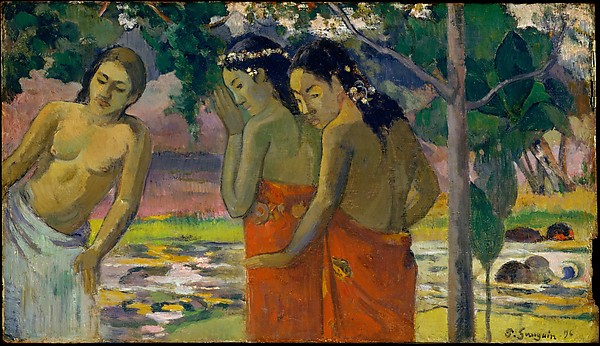The Legacy of Tribes
G. Murphy Donovan (August 2013)

Paul Gaugin 1896
Over time, the human animal, with the help of prototypes, became the apex predator. Killing lesser critters evolved from necessity to sport. In Spain, and post-colonial Hispania, livestock are killed for amusement to this day. Rare African antelope are bred in Texas too, so wealthy sportsmen can pretend to be big game hunters on safari. Trout streams are stocked for other swells to play at fishing. Blood sports are sporting in the same sense that gambling is gaming.
None of this was ever good news for other species except maybe dogs, cattle, sheep, pigs, chickens, catfish, and mud bugs. Dogs flourished because they are much easier to love than men. Sheep survived because some men find them attractive. Cattle and catfish survived because all men are fond of a cheap lunch, ever seeking the path of least resistance. Raising and grazing was easier than chasing game. Thusly, did the hunter-gatherer become a planter, a herder, or a franchise owner.
Village, town, city, state, and nation all emerged from small centers of tribal commerce where competition and enterprise became the font of all progress. Some of the competition was collegial, yet much was not.
nefarious characters” (a Clapperism for Islamists) on the other side of the globe.
Yeager. Calling someone controlling an unmanned drone a pilot is more than a bit of an oxymoron, but that’s another matter. And wearing a flight suit to sit at a government keyboard is a little like wearing a cup and jock strap to a video arcade. Clearly, reality doesn’t matter: the pretense of combat is necessary to rationalize intercontinental mayhem. And after a hard day of digital strife in Nevada, a USAF “pilot” might get to roll a little craps and catch a girlie show in Vegas before the next shift.
These are the modern rituals of tribes. Yes, tribes! We like to think of ourselves as urbane, evolved citizens with global, if not noble, ideals. We have institutions that say as much. The United Nations (UN) is just one example. The UN is an inclusive club that began with a handful of tribes and now the nation state count is 193 and rising. The growth of tribes may not be exponential, but surely it is centrifugal. New nations spin off on a regular basis.
And each nation is a cluster of smaller tribes, each jostling or killing each other for advantage. The great mystery that plagues international and domestic tribalism is the question of success. Why do some tribes succeed and others wallow in generational dysfunction?
Of course you could argue about exceptions such as the Deutch model where knickers are only laundered once a month. Yet, Germans still qualify as hygienics due to excellent plumbing. Surely the saunas of Scandinavia are a testament to the Nordic willingness to suffer for hygiene. And the English invented the crapper! But only a German could raise the porcelain commode to high art.
So there you have it! Successful societies read the Times on flush toilets.
Of course, all of this might begin with a good brisket. Competent nations must first learn to feed the tribe without a loan from the IMF. Next, nations must deal with the inevitable consequences of things like a three-bean casserole or a bogus burrito. Here, the flush toilet comes in handy. If there are any accidents, a change of boxers or briefs is de rigueur. And finally, real progress comes full circle with a real bath. Tribal success begins and ends with sanitation.
G. Murphy Donovan writes occasionally about Intelligence, national security, and politics.
To comment on this article, please click here.
here.
If you enjoyed this article by G. Murphy Donovan and want to read more of his work, please click here.